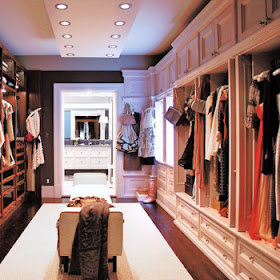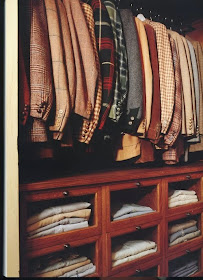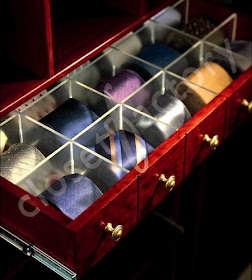In our current temporary digs (and even in our previous cottage) our closet arrangements resemble this:

Tightly packed clothes without space to breathe or relax wrinkle free. So we are very much looking forward to the day when we can dispense with the sardine games and enjoy the space of having an actual dressing room.
Previously I shared my desire for a proper dressing room and my penchant for dressing well (as Tom Ford puts it, "Dressing well is a form of good manners"). This post however addresses the practicalities of designing a dressing room. Over the past few months I have been taking in ideas for storage and design and have collected my thoughts here in this post. It became plain to me that for the fashion conscious ladies out there inspiration abounds, but for the sartorially sensitive gentlemen there is a dirth of ideas by comparison. Here is a shot of inspiration for those toying with renovating their own closets or creating a dressing room of their own.
Centre Islands
Central islands with drawers and a nice surface for display or setting our clothes are a popular and stylish idea for getting the extra storage space when the walls are just not enough. Through matching wooden millwork one can create a space equally as beautiful as the bespoke fitting room of a Jermyn street tailor or 5th avenue boutique...



Ottomans
Perhaps one might prefer an ottoman in the centre of the room, to sit on to put on ones shoes and socks...
or, if space allows, a sofa even...
Alcove and Bench
If the space dose not allow for a centre island, then a desk, table or alcove with drawers, a surface and a mirror can be very useful for storing items such as watches, cuff-links, tie clips, pocket squares, braces, cologne, shoe horns, gloves, belts, etc.







Trouser Storage
How to hang trousers? Well, I'm used to hanging them inside the jacket to which they belong, simply because of economy of space and economy of hangers. But, more often than not one wears the trousers sans jacket, so it makes sense to be able to store them as separates...
How to hang trousers? Well, I'm used to hanging them inside the jacket to which they belong, simply because of economy of space and economy of hangers. But, more often than not one wears the trousers sans jacket, so it makes sense to be able to store them as separates...
Pull-out Cupboards
Pull-out cupboards are also useful for men's long dangling things such as belts, ties, and scarves...
Pull-out cupboards are also useful for men's long dangling things such as belts, ties, and scarves...

For men with many suits and shirts, double rails for double the hanging space does make sense...



Folded Shirts and Jerseys
If hanging your shirts up is not your thing, you'd better allow for selves or drawers in which to place folded items...

What would Jeeves do?
Over-All Organisation
Top to toe seems a very sensible way to organize a dressing room to me. Hats at the top...

Shirts, jackets and coats in the middle...
and shoes at the bottom...



Ties are a pain. To hang or to roll (but never to fold)...
and assorted accessories
To close in or to leave open?
I really wasn't sure. On the one hand I have clothes that I seldom wear, which have gathered dust on the shoulders (and back in the UK we have those horrid little moths which eat one's jerseys). On the other, surely fabric needs the breathe and be aired so it doesn't smell musty? So I did some research and came across this credible advice from The Butler's Closet. It suggests that clothes should be in the open and allowed to breathe, but that seldom worn items should be protected with unbleached cotton covers. Items should never be left in dry-cleaning bags or garment bags as they can molder and the petroleum in the plastic can cause the fabric to become odoriferous. So, I presume that as long as the clothes have space around them and adequate ventilation, you could cover your clothes in, as long as they were not hermetically sealed.
I really wasn't sure. On the one hand I have clothes that I seldom wear, which have gathered dust on the shoulders (and back in the UK we have those horrid little moths which eat one's jerseys). On the other, surely fabric needs the breathe and be aired so it doesn't smell musty? So I did some research and came across this credible advice from The Butler's Closet. It suggests that clothes should be in the open and allowed to breathe, but that seldom worn items should be protected with unbleached cotton covers. Items should never be left in dry-cleaning bags or garment bags as they can molder and the petroleum in the plastic can cause the fabric to become odoriferous. So, I presume that as long as the clothes have space around them and adequate ventilation, you could cover your clothes in, as long as they were not hermetically sealed.

Hiding clothes does offer a tidy look...

Open space...
Mirrors
A full length mirror is a must to complete a dressing room. There is no other way to ensure the one looks spiffing from top to toe (for asking one's partner if sure to elicit a favourable response even if perhaps dishonest). Being asked to get ready for dinner without one is just plain cruel.


Hangers
Finally we turn our attention to the matter of the hanger itself. Wood is good, wire is bad, anything else is a compromise and padded crocheted hangers are for people in rest-homes only. We have decided to have mahogany and oak hangers, for we both wear the same shirt size, and have several shirts which are similar and easily confused. Thus, as long as the house keeper hangs my shirts on dark hangers and Peter's on light ones, and ensures that all the hangers are blocked together, it will save confusion (and arguments about whose white shirt was the one with the stain on it!).
Finally we turn our attention to the matter of the hanger itself. Wood is good, wire is bad, anything else is a compromise and padded crocheted hangers are for people in rest-homes only. We have decided to have mahogany and oak hangers, for we both wear the same shirt size, and have several shirts which are similar and easily confused. Thus, as long as the house keeper hangs my shirts on dark hangers and Peter's on light ones, and ensures that all the hangers are blocked together, it will save confusion (and arguments about whose white shirt was the one with the stain on it!).
Wood good...








































































Beautiful closets. I have had both open and closed behind doors closets, and I much prefer closed. I have never had an issue of moths behind closed doors; but have in open closets.
ReplyDeleteI also prefer the aesthetics. I'm not the type who wants to constantly sort out my clothes by colour, type, length, season etc. Unless its sorted it looks a mess; (unlike these organized, sorted and styled photos) and nobody wants to take a photo of that.